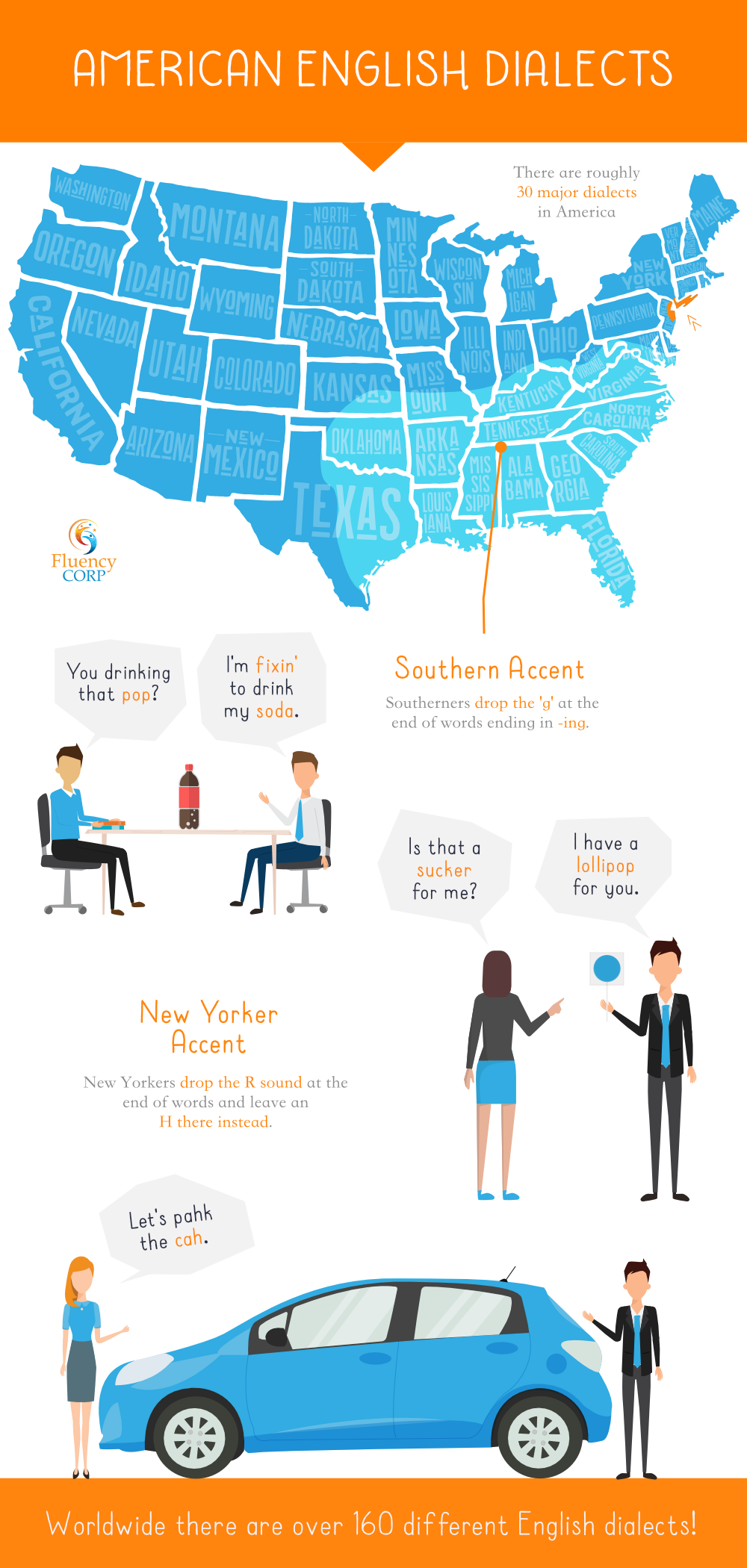In American, Americans all speak the same American English. Right?
Quite wrong actually. And you’d realize this quickly if you’ve been to Lafayette, LA, New York City, NY, or Oklahoma City, OK.
Americans speak dialects of English based on the region where they grew up, most likely.
So, an American might run into a convenience store to grab a soda or grab a pop. An American might say they’re eating a lollipop or quite possibly a sucker. An American might say they’re going to pahk the cah, or they’re going to park the car. They might be fixin’ to do something or about to do it.
With so many ways of saying the same thing and so many accents when saying it, it’s a wonder we all understand each other. But of course we do. 99% of the words we’re saying are the same, even if we have to sometimes strain to hear it through a thick regional accent.
How Many American English Dialects are there?
There are roughly 30 major dialects in America. Go here if you’d like a see a map of the various regions with an example of what each dialect might sound like.
On the East Coast, we have many very small regions, with slightly varying dialects in each one. Just like New England and the East Coast itself, it is more densely populated, with little pockets of immigrants from other countries.
For this reason we have Boston Urban, Bonac, New Yorker, Hudson Valley, Pennsylvania German-English, Inland Northern and North Midland, all within about 5 hours driving from each other.
Once you start going west, many of the regional dialects will span 3-4 states, with Texas alone having just two: Southwestern and Gulf Southern.
The entire West Coast will only encompass three dialects, and these areas are also known for having more of a neutral accent: Pacific Northwest, Pacific Southwest, and some Southwestern (just like in Texas).
What are Some of the Differences in American English Dialects?
The New York Dialect
The most famous of English dialects would have to be the New Yorker (which gets confused with a few New England-are accents). Due to Hollywood films, most can detect the New Yorker accent quite quickly.
But where does it come from? A sociolinguistics professor out of NY says it is a knockoff of British English. That’s why New Yorkers drop the R sound at the end of words and leave an H there instead.
Also in Boston and Rhode island, there is a similar happening. When I was living in Boston, some of my Massachusetts and Rhode Island friends would call me Miker, instead of Micah, because they were dropping the H sound at the end and adding an R. So H and R are opposite of each other when at the end of the word. Water becomes wahdah, and Micah becomes Miker.
A Combination of Southern Dialects
The Southern accent (which is actually about 7 distinct accents) is also very well-known in the United States and one of the more obvious dialects. It can be hard to differentiate which Southern accent someone might have, unless you’re actually from this area.
When my mother came to visit me in Boston (we’re from Oklahoma City), the waitress immediately said, “Oh cute, where are you from?” The funny thing is, my mother was thinking the same thing about her!
Most prominent in these areas is dropping the ‘g’ at the end of words ending in -ing. I’m goin’. I’m eatin’. I’m listenin’. Another feature is long, drawn-out vowels.
Are You Looking for Online Individual Language Classes?
Do Dialects Keep Us from Understanding Each Other?
For the most part, dialects do not necessarily keep us from understanding each other, seeing as two-thirds of Americans speak, what is known as, Standard American or General American, also known as non-regional American accent. Here are some recordings of those non-regional accents at play.
But, they can throw a wrench in the conversation if you encounter someone who has a strong propensity for their own dialect. For example, I had a hard time understanding my friend’s grandmother in Lafayette, LA.
I do not know if it was purely accent, or if it was slang and idioms that confused me, but I honestly did not follow what was being said. I was shocked, as this was the first time I could not understand someone speaking English.
There are other dialects that might challenge you (depending on where you’re from), but that you can still follow. For example, when I moved from Oklahoma City to Boston, I had to ask what a few new phrases meant.
I didn’t use the word ‘packy’ to talk about the liquor store. I did not use the word ‘butt’ to talk about a fresh cigarette. In Oklahoma, the butt was the end of it, and it had already been smoked. So when people were asking me to borrow an already smoked cigarette, I didn’t understand why they would want it.
Very quickly, all the unknown vocabulary was explained and I adapted and assimilated. I feel, on the other hand, it would have taken me longer in Lafayette.
5 Ways to Ensure your American English Regional Dialect is Understood
- Be aware of how often you use idioms or descriptive phrases that are not literal
- If you want to say ‘there’s more than one way to skin a cat’, try to simplify it by saying, ‘I think we can find another solution’
- If you know that you drop certain letters in words, try to be hyper vigilant to pronounce letters that help others understand you, especially during conference calls when people cannot see your face
- Whenever you can, make sure the video is on during a conference call (this helps with understanding)
- Start to notice which vocabulary words people ask about, and when possible, try to use your preferred word and also a synonym, to ensure understanding
Using American Dialects to Bring Us Closer Together
When you’re traveling abroad, and it’s been 10+ days of hearing only Japanese, reading (Ha!) only Japanese on street signs and subway tunnels, and then, all of a sudden you hear someone speaking in English… what do you do?
I don’t know about you, but I get excited to speak to someone that will truly understand me. I want to hug that person and never let them go. It makes me feel like I am at home, comforted and understood.
This can happen even when we’re speaking the same language. After living in Boston for 10 years, I feel like the Boston accent, and even the New York accent, feel like home to me.
When I went through airport security at Dallas Fort Worth International airport a few months ago (I now live in Dallas), one of the security guards had a strong Long Island accent, and I made familiar chit chat with him, asking him why he had moved and if he liked it in Texas.
It really made me smile to speak with him, and I felt nostalgia for my time in Boston and New York, and my family from Long Island. I instantly felt like I had a connection with him.
Hearing someone who sounds like you, or who reminds you of someone familiar, can instantly give a connection and even science says it can make you trust them more.
A study was done with accents, which concluded that we trust accents that sound more like our own. Although, the study also noted that those who sounded most confident were trusted the most, accent or no accent.
It doesn’t necessarily have to be a foreign accent either; the fact is, we trust those who have the same background as we do, and your accent says a lot about that past: values, education, same upbringing, similar understanding of situations, and more.
This is just the tip of the iceberg when it comes to English dialects. Worldwide, there are over 160. Keep an eye out for them and get to know where people are from. Accents and dialects can bring people close together or farther apart, but we hope, with a certain perspective about dialects and accents, that our curiosities about them will bring us closer together.
For a free consultation, contact us or call us at (800) 401-3159. Read success stories on our testimonials page.

Share this Image On Your Site!
Please include attribution to FluencyCorp.com with this graphic.










